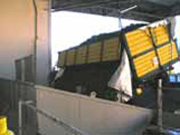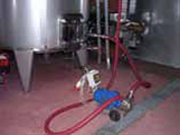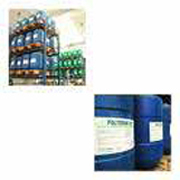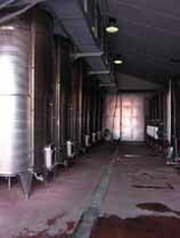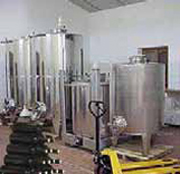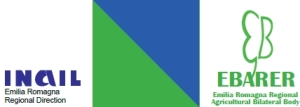Card 08.01 Cellars
THE RISKS:
- Contamination (due to operator using and coming in contact with chemical substances)
- Intoxication and asphyxia (due to chemical products inhalation and lack of oxygen)
- Muscles and backbone damages (due to manual load transport)
- Heat strokes (due to high levels of humidity)
- Cuts, bumps and crushing (due to coming in contact with exposed parts and fall in the discharge/reception tank)
- Bites and anaphylactic shock (due to insects presence during unloading)
- Noise (due to noisy equipment/vehicles)
- Electrocution (due to uncovered electrical parts, short circuits, poor equipment maintenance and unsuitable projecting and realization)
It is necessary to remind that:
An appropriate facility designing and a strict observance of measures managing equipment for transformation process are the fundamental for
accident prevention inside the wine cellar.
PRACTICAL AND OPERATING INDICATIONS:
Operator shall not remove auger's protection from the grape receiving tank. In case of flooding operator shall stop the machine before any intervention. Protections shall be removed exclusively for maintenance and when the machine is completely stopped.
Equipment shall be kept in apple-pie order and equipment and system maintenance shall be regularly carried out.
Operator shall wear suitable P.P.E.:
- anti-skid shoes;
- clothes adapted to climatic conditions;
- adopt proper precautions for removing the tartar with caustic soda or other chemical products (anti-skid boots with ankle protection, gloves and goggles);
- adopt suitable respirators with double filter in all filtering phases.
Chemical products use:
- nobody but authorized and trainedworkers can operate with chemical products;
- chemical and powdery substances hall be kept isolated in appropriate lockers;
- use always original packings to preserve products and their remains;
- any mixing operation shall be conducted outside the producing environment.
Cleaning casks:
- operator shall check the absence of hazardous gasses before containers, tanks and depots clean and maintenance;
- operator shall always wear respirator;
- operator shall wear individual clothes against fan flows;
- operator shall switch on the fan to change air 15 minutes before operating;
- operator shall interrupt cleaning if the fan switches itself off or if it does not work properly;
- operators shall work in twos at least.
It is necessary to reduce manual load within sensible limits: 25 kg for men and 15 kg for women. These limits shall be changed by the "Risk Evaluation" issue.
Operators shall transport heavy weights in two or with mechanical vehicles such as fork-lift truck, transpallets and wheelbarrows.
FURTHER INDICATIONS AND ADVICE
- Generally the frequency and other parameters which characterise discharging baskets phase do not pose risks. A specific evaluation shall be carried out on manual load transport however.
- It is strictly forbidden to transport people with fork-lifters. If the grape discharging tank is sunken, it shall be protected laterally preventing operator's fall.
- Normally, the grape discharging tank shall be kept closed and locked when it is not used (e.g. with metallic sheets difficult to remove).
- Augers board which send grapes to the crusher-stemmer shall be in conformity with the regulations.
- "Soft press" shall be provided with lock for the downtime when doors are opened (during washing, doors will be opened and/or the board shall be disconnected).
- Noise emission level and its exposition to operators shall be established, and in case steps can be taken (e.g. acoustic isolation or P.P.E. adoption).
- During fermentation enough openings shall be provided for an adequate change of air.
- A fan shall be switched on before the cask cleaning (at least 15 minutes ahead).
- Every auger and other moving parts shall be protected.
- An adequate continuous fermentation system shall be provided (according to the norms).
- An "overflowing" alarm shall be provided.
- If filtration is performed with perlite, suitable respirator with double filter shall be wore each time the operator may come in contact with it (hazard due to extra fine granulometry).
- If kieselguhr filtration is performed, precautions against its inhalation and ingestion shall be adopted (studies state its dangerousness).
- During wine-making and its preservation, if sulphur dioxide is used, it shall be used in concentrated watery solution. If sulphur dioxide is used in gaseous state (sulphur dioxide alone and/or mixed with sulphur trioxide or carbon monoxide) authorizations are needed for its usage and its keeping in depots or warehouses, if it overcomes 75 kg.
- Compressed and/or liquefied gas cylinders shall be kept locked with chains and positioned to prevent bumping risks.
- Foot irons with cage shall be provided to climb on silos, and shall be complete with anti-skid feet and standard riser.
- Il montacarichi (ove presente) deve essere periodicamente revisionato e sottoposto a idonea manutenzione.
- The elevator, if present, shall be periodically serviced and maintenance shall be carried out..
- Suitable P.P.E. shall be adopted as precautions for removing the tartar with caustic soda or other chemical products (anti-skid boots with ankle protection, gloves and goggles).
- The bottling chain shall be provided with locking systems operating according to the rules.
- Liquid remains shall be put into the Imhoff tank or into a validated disposal system.
